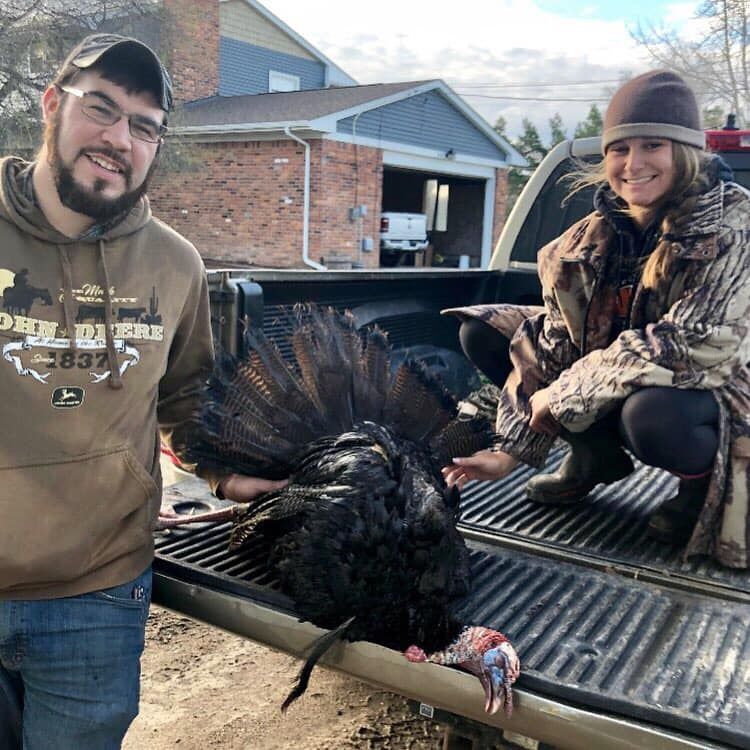Private Land Privilege
I grew up with the public land experience. Although I haven’t always been a hunter, I’ve spent countless hours hiking through the woods of the Lapeer State Game Area (there were perks to living less than 2 miles from it) and fishing its small, inland lakes. Some of my best childhood memories are nestled at the heart of public land.
The thought of owning my own property for outdoor recreation never occurred to me, most likely because we didn’t NEED it. What a gift that was! We had a place close to home that allowed my family every opportunity – hunting, fishing, hiking, bird watching and more within walking distance. Most people don’t have that without at least loading up a vehicle.
Then, eight years ago, I met a farmer that I would someday call my husband. His outdoor experience had been the complete opposite of mine. With a 3,000-acre cash crop farm with over 100 huntable acres of woods divided into separate locations, he (and his family) had what most people would dream of owning. It truly was and is paradise…or as close to it as you can get in flat, agriculture-based Shiawassee County, Michigan.

Youth hunter, Emme Lantis, harvested her first turkey on private land in Shiawassee County
Over the last several years I have added deer, turkey, waterfowl, rabbit, coyote, pheasant hunting and trapping to my resume. Although these are all things that I could have accomplished on public land, I was able to learn more about wildlife management due to direct application. Our freedom to engage with conservation practices and make management decisions based on our own observation and harvests stems from organizations like the Quality Deer Management Association, Pheasants Forever, National Wild Turkey Federations and Natural Resources Conservation Service that provide education and financial assistance. In many ways, this learning brought me into the career field that I enjoy today.
Having access to well-managed, private land is something that I have not taken for granted.
It’s also something that I have a growing need to share.
Mentoring new hunters, youth or adults, is one of the most popular topics in the outdoor industry nationwide. We KNOW we have to increase participation for the future of our hunting heritage. What we don’t always talk about is what else we do aside from harvesting an animal and eating the meat. Having conversations about habitat and management is a way to further connect humans to their food source. The quality of meat depends on the available protein and other nutrients on the landscape for an animal to consume. We have some control over that as private land managers. Your mentees may even want to be involved in hands-on management prior to their hunt. By doing this, you are bridging the gap that most people see only as the space between a broadhead and a heart.

New waterfowl hunters all had success on the same private pond in Genesee County
The most important thing you can do aside from making sure your mentee feels safe and confident with their firearm or bow is to make sure they feel confident asking you questions. There is a fine line between overwhelming them with information and providing enough that they make the connections. These connections cross the boundaries of nature and humanity.
Landowner to landowner, I encourage you to consider your property a privilege. Even though you worked for it and you have rights to it, it’s an opportunity that many will never have. If you have the chance to support a new hunter by getting them in the field, do it. Show them the process and show them why you care about your land and how to care for it. For some, they simply don’t know what it’s like to connect the dot from the outdoors to themselves in a hands-on way. Even if they don’t purchase land of their own, you will have shown them the value of contributing to the outdoors in a safe environment. They will carry that with them on all of their pursuits – on private or public land.
As someone who has been both the student and the teacher, I can ensure you that your time and commitment is the most constructive thing you can give someone. The rest will come. They will shoot, miss, connect, ask questions and remember what it was like to have someone care enough about something to share it with others. Hopefully, they do the same somewhere down the line. It starts with you.
Happy hunting ~
The post Private Land Privilege appeared first on Michigan United Conservation Clubs.
Recent Posts



